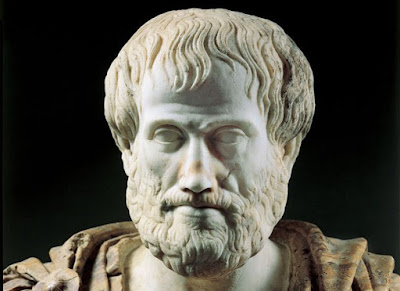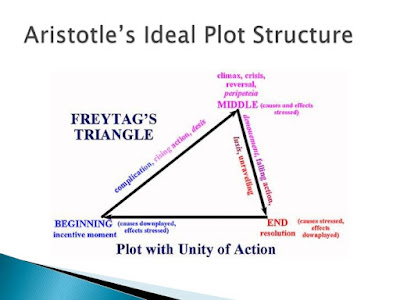ARISTOTLE & THE ELEMENTS OF TRAGEDY
The
classic discussion of Greek tragedy is Aristotle's Poetics. He defines
tragedy as "the imitation of an action that is serious and also as having
magnitude, complete in itself." He continues, "Tragedy is a form of
drama exciting the emotions of pity and fear. Its action should be single and
complete, presenting a reversal of fortune, involving persons renowned and of
superior attainments, and it should be written in poetry embellished with every
kind of artistic expression." The writer presents "incidents arousing
pity and fear, wherewith to interpret its catharsis of such emotions" (by catharsis,
Aristotle means a purging or sweeping away of the pity and fear aroused by the
tragic action).
The
basic difference Aristotle draws between tragedy and other genre such as comedy and the epic, is the "tragic pleasure of pity and
fear" the audience feel watching a tragedy. In order for the tragic hero
to arouse these feelings in the audience, he cannot be either all good or all
evil but must be someone the audience can identify with; however, if he is
superior in some way(s), the tragic pleasure is intensified.
The
tragic hero's powerful wish to achieve some goal inevitably encounters limits,
usually those of human frailty (flaws in reason, hubris, society), the gods
(through oracles, prophets, fate), or nature. His disastrous end results from a
mistaken action, which in turn arises from a tragic flaw or from a tragic error
in judgment (hamartia). Often the tragic flaw is hubris, an excessive
pride that causes the hero to ignore a divine warning or to break a moral law. The
hero need not die at the end, but he/she must undergo a change in fortune. In
addition, the tragic hero may achieve some revelation or recognition
(anagnorisis--"knowing again" or "knowing back" or
"knowing throughout") about human fate, destiny, and the will of the
gods. Aristotle quite nicely terms this sort of recognition "a change from
ignorance to awareness of a bond of love or hate." It has been suggested
that because the tragic hero's suffering is greater than his offense, the
audience feels pity; because the audience members perceive that they could
behave similarly, they feel pity.
Definition of
Tragedy (From the Poetics of Aristotle [384-322 BCE)
"Tragedy, then, is a process of imitating an
action which has serious implications, is complete, and possesses magnitude; by
means of language which has been made sensuously attractive, with each of its
varieties found separately in the parts; enacted by the persons themselves and
not presented through narrative; through a course of pity and fear completing
the purification (catharsis, sometimes translated "purgation") of
such emotions."
a) "imitation" (mimesis):
Contrary to Plato, Aristotle asserts that the artist does not just copy the
shifting appearances of the world, but rather imitates or represents Reality
itself, and gives form and meaning to that Reality. In so doing, the artist
gives shape to the universal, not the accidental. Poetry, Aristotle says, is
"a more philosophical and serious business than history; for poetry speaks
more of universals, history of particulars."
b) "an action with serious implications": serious
in the sense that it best raises and purifies pity and fear; serious in a
moral, psychological, and social sense.
c) "complete and possesses magnitude": not
just a series of episodes, but a whole with a beginning, a middle, and an end.
The idea of imitation is important here; the artist does not just slavishly
copy everything related to an action, but selects (represents) only those
aspects that give form to universal truths.
d) "language sensuously attractive...in the parts": language
must be appropriate for each part of the play: choruses are in a different
meter and rhythm and more melodious than spoken parts. Ancient Greek tragedy
had a chorus whose role was to comment on the action of the play. The chorus
sometimes sang their part. Aristotle said that the language should be easy to
listen to. It should have rhythm and also good harmony for the lines that were
sung.
e) tragedy (as opposed to epic) relies on an enactment
(dramatic performance, not a "narrative" (the author telling a
story).
f) "purification" (catharsis): tragedy first raises (it does not
create) the emotions of pity and fear, then purifies or purges them. Whether
Aristotle means to say that this purification takes place only within the
action of the play, or whether he thinks that the audience also undergoes a
cathartic experience, is still hotly debated. One scholar, Gerald Else, says
that tragedy purifies "whatever is 'filthy' or 'polluted' in the pathos,
the tragic act" (98). Others say that the play arouses emotions of pity
and fear in the spectator and then purifies them (reduces them to beneficent
order and proportion) or purges them (expels them from his/her emotional
system).
Aristotle said
that tragedy has six main elements:
1. Plot 4. Diction
2. Character 5. Melody
3. Thought 6. Spectacle
The last four elements
(Thought, Diction, Melody, and Spectacle) are the least important, but
Aristotle felt they must be done well for the play to succeed.
Thought is the power of
saying whatever can be said and should be said at each moment of
the plot. Do the lines spoken by the actors make sense? Are they saying what should
be said at each particular moment in the play?
Diction is the actual
composition of the lines that are recited. Thought deals with what is
said, and diction deals with how it is said. There are many ways to say
something. A good playwright composes lines that say something extremely well.
In a good play, some lines are so well constructed that the audience can leave
the play quoting the lines exactly.
Melody and Spectacle are
accessories. The Greeks sometimes used musical
accompaniment. Aristotle
said the music (melody) has to blend in with the play
appropriately. Spectacle
refers to the staging of the play. Again, as with
melody, the spectacle
should be appropriate to the theme of the play.
Character
Character is the second
most important element of tragedy. Each character has an essential quality or
nature that is revealed in the plot. The moral purpose of each character must
be clear to the audience. The characters should have four main qualities.
A. No matter who they
are (hero or slave), the characters must be good in some way.
B. The characters should
act appropriately for their gender and station in life.
C. The characters have
to have believable personalities.
D. Each character must
act consistently throughout the play. In other words, nothing should be done or
said that could be seen as “acting out of character.”
The
Tragic Hero:
The tragic hero is "a [great] man who is neither
a paragon of virtue and justice nor undergoes the change to misfortune through
any real badness or wickedness but because of some mistake."
a) “a great man: " one of those who stand in
great repute and prosperity, like Oedipus, King of Thebes: “conspicuous men
from families of that kind." The hero is neither a villain nor a model of
perfection, but is basically good and decent.
b) "mistake" (hamartia): This Greek word,
which Aristotle uses only once in the Poetics, has also been translated as
"flaw" or as "error." The great man falls through--though
not entirely because of--some weakness of character, some moral blindness, or
error. We should note that the gods also are in some sense responsible for the
hero's fall.
Plot
The best tragic plot is single and complex, rather
than double ("with opposite endings for good and bad"--a
characteristic of comedy in which the good are rewarded and the wicked
punished). All plots have some pathos (suffering), but a complex plot includes
reversal and recognition.
a) "reversal"
(peripeteia): occurs when a situation seems to developing in one direction,
then suddenly "reverses" to another. For example, when Oedipus first
hears of the death of Polybus (his supposed father), the news at first seems
good, but then is revealed to be disastrous. Change by itself is not enough.
The character involved in the change must have specific characteristics to
arouse the tragic emotions of pity and fear.
The true tragic hero
cannot be too good or too bad, but he must end up in misery.
Aristotle concluded that the best tragedy centers on a
basically good man who changes from happiness to misery because of some
great error. For example, he might have a good quality, like pride, that
gets out of hand.
b) "recognition"
(anagnorisis or "knowing again" or "knowing back" or
"knowing throughout" ): a change from ignorance to awareness of a
bond of love or hate. For example, Oedipus kills his father in ignorance and
then learns of his true relationship to the King of Thebes.
Recognition scenes in tragedy are of some horrible
event or secret, while those in comedy usually reunite long-lost relatives or
friends. A plot with tragic reversals and recognitions best arouses pity and
fear.
The plot of a tragedy
also involves some horrible or evil deed. The tragic hero either does it consciously,
does it out of ignorance, or mediates it (makes it easy for the
deed to happen). For the audience to be horrified by the evil deed, the evil
has to be done to someone important to the tragic hero. If the hero kills his
enemy, the deed won’t seem so
bad. On the other hand,
if the hero kills someone he doesn’t care about, the audience won’t care much
either. To make it really horrible for the audience, Aristotle suggested
that the evil deed should be done to a family member.
c) "suffering" (pathos):
Also translated as "a calamity," the third element of plot is "a
destructive or painful act." The English words "sympathy,"
"empathy," and "apathy" (literally, absence of suffering)
all stem from this Greek word.
The Tragic Form over Time
The Tragic Form, as identified by Aristotle undergoes
changes through the years, though it’s rudiments are still visible into some of
today’s tragedies.







No comments